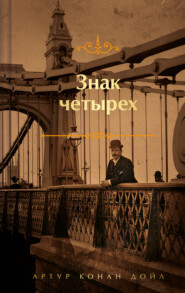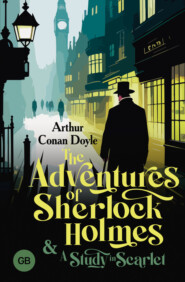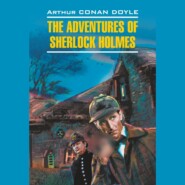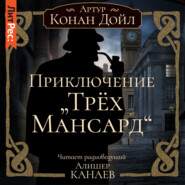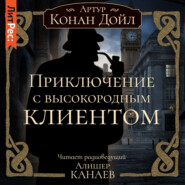По всем вопросам обращайтесь на: info@litportal.ru
(©) 2003-2024.
✖
Этюд в багровых тонах / A Study in Scarlet
Настройки чтения
Размер шрифта
Высота строк
Поля
The old woman looked keenly at him.
“The gentleman asked me for my address,” she said. “Sally lives in lodgings at 3, Mayfield Place, Peckham.”
“And your name is…?”
“My name is Sawyer – hers is Dennis. Tom Dennis married her, a smart lad…”
“Here is your ring, Mrs. Sawyer,” I interrupted; “it clearly belongs to your daughter, and I am glad to restore it to the rightful owner.”
With many words of gratitude the old crone took the ring and went down the stairs. Sherlock
Holmes sprang to his feet and rushed into his room. He returned in a few seconds.
“I’ll follow her,” he said, hurriedly; “she must be an accomplice, and will lead me to him. Wait here.”
And Holmes descended the stair. It was nine when he left. Ten o’clock passed, eleven, he did not come back. It was about twelve when I heard the sharp sound of his key. When he entered, he laughed.
“So what?” I asked.
“That woman went a little when she began to limp. Then she hailed a cab. I was close to her so I heard the address, she cried loud enough, ‘Drive to 13, Duncan Street, Houndsditch.’ When she was inside, I perched myself behind. Well, we reached the street. I hopped off before we came to the door. The driver jumped down. He opened the door and stood expectantly. Nobody came out. There was no sign or trace of his passenger. At Number 13 a respectable paperhanger lives, he never heard about Sawyer or Dennis.”
“You want to say,” I cried, in amazement, “that that feeble old woman was able to get out of the cab while it was in motion?”
“Old woman!” said Sherlock Holmes, sharply. “We were the old women ourselves. It was a young man, an incomparable actor. It shows that the criminal has friends who are ready to risk something for him.”
Chapter VI
Tobias Gregson Shows What He Can Do
The papers next day were full of the “Brixton Mystery,” as they termed it. There was some information in them which was new to me.
The Daily Telegraph mentioned the German name of the victim, the absence of all other motive, and the sinister inscription on the wall; all that pointed to political refugees and revolutionists. The Standard said that the victim was an American gentleman who was staying in Camberwell.
He has his private secretary, Mr. Joseph Stangerson. They left their landlady upon Tuesday, the 4th., and departed to Euston Station to catch the Liverpool express. Then Mr. Drebber’s body was discovered in an empty house in the Brixton Road, many miles from Euston. How he came there, or how he met his fate, are questions. Where is Stangerson? Nobody knows. We are glad to know that Mr. Lestrade and Mr. Gregson, of Scotland Yard, are both engaged upon the case, and they will soon throw light upon the matter.
The Daily News said that it was a political murder.
Sherlock Holmes and I read these articles at breakfast.
“What is this?” I cried, for at this moment there came the pattering of many steps in the hall and on the stairs.
“It’s the Baker Street detective police,” said my companion, gravely. As he spoke there rushed into the room half a dozen of dirty street boys.
“Hush!” cried Holmes, in a sharp tone. “In future you will send Wiggins alone to report. Any news, Wiggins?”
“No, sir,” said one of the youths.
“I knew that. Here are your wages.” He handed each of them a shilling. “Now go away and come back with a better report next time.”
They scampered away downstairs like rats.
“One of those little beggars is better than a dozen of the policemen,” Holmes remarked. “These youngsters go everywhere and hear everything.”
“Are you employing them for this Brixton case?” I asked.
“Yes. It is merely a matter of time. Oh! Here is Gregson coming down the road. He wants to visit us, I know. Yes, he is stopping. There he is!”
There was a violent peal at the bell, and in a few seconds the fair-haired detective came up the stairs.
“My dear fellow,” he cried, “congratulate me! I solved the problem.”
“Do you mean that you know the criminal?” asked Holmes.
“Sir, we have the man under lock and key!”
“And his name is?”
“Arthur Charpentier, sub-lieutenant in Her Majesty’s navy[41 - Arthur Charpentier, sub-lieutenant in Her Majesty’s navy – Артур Шарпентье, младший лейтенант флота Её Величества],” cried Gregson, pompously.
Sherlock Holmes smiled.
“Take a seat,” he said. “And please tell us everything.”
The detective seated himself in the arm-chair. Then suddenly he slapped his thigh.
“The fun of it is,” he cried, “that that fool Lestrade, who thinks himself so smart, went the wrong way. He suspects the secretary Stangerson, who has nothing with the crime.”
Gregson laughed.
“And how did you get your clue?” I asked.
“Ah, I’ll tell you all about it. Of course, Doctor Watson, this is strictly between ourselves. The first difficulty was to finding the information about the victim’s American life. Do you remember the hat beside the dead man?”
“Yes,” said Holmes; “by John Underwood and Sons, 129, Camberwell Road.”
“I had no idea that you noticed that,” said Gregson. “Well, I went to Underwood, and asked him about the customer of that hat. He looked over his books, and found him. He sent the hat to a Mr. Drebber, residing at Charpentier’s Boarding Establishment, Torquay Terrace[42 - Charpentier’s Boarding Establishment, Torquay Terrace – пансион Шарпантье на Торки-Террас]. Thus I got at his address.”
“Smart – very smart!” murmured Sherlock Holmes.
“Then I met Madame Charpentier,” continued the detective. “I found her very pale and distressed. Her daughter was in the room, too. Her lips trembled as I spoke to her. That didn’t escape my notice. I began to smell a rat. You know the feeling, Mr. Sherlock Holmes – a kind of thrill in your nerves. ‘Do you know about the mysterious death of your boarder Mr. Enoch J. Drebber, of Cleveland?’ I asked.
The mother nodded. The daughter burst into tears[43 - burst into tears – расплакалась]. ‘At what o’clock did Mr. Drebber leave your house for the train?’ I asked.
‘At eight o’clock,’ she said. ‘His secretary, Mr. Stangerson, said that there were two trains – one at 9.15 and one at 11. He wanted to catch the first.
‘And did you see him after that?’
A terrible change came over the woman’s face as I asked the question.
“The gentleman asked me for my address,” she said. “Sally lives in lodgings at 3, Mayfield Place, Peckham.”
“And your name is…?”
“My name is Sawyer – hers is Dennis. Tom Dennis married her, a smart lad…”
“Here is your ring, Mrs. Sawyer,” I interrupted; “it clearly belongs to your daughter, and I am glad to restore it to the rightful owner.”
With many words of gratitude the old crone took the ring and went down the stairs. Sherlock
Holmes sprang to his feet and rushed into his room. He returned in a few seconds.
“I’ll follow her,” he said, hurriedly; “she must be an accomplice, and will lead me to him. Wait here.”
And Holmes descended the stair. It was nine when he left. Ten o’clock passed, eleven, he did not come back. It was about twelve when I heard the sharp sound of his key. When he entered, he laughed.
“So what?” I asked.
“That woman went a little when she began to limp. Then she hailed a cab. I was close to her so I heard the address, she cried loud enough, ‘Drive to 13, Duncan Street, Houndsditch.’ When she was inside, I perched myself behind. Well, we reached the street. I hopped off before we came to the door. The driver jumped down. He opened the door and stood expectantly. Nobody came out. There was no sign or trace of his passenger. At Number 13 a respectable paperhanger lives, he never heard about Sawyer or Dennis.”
“You want to say,” I cried, in amazement, “that that feeble old woman was able to get out of the cab while it was in motion?”
“Old woman!” said Sherlock Holmes, sharply. “We were the old women ourselves. It was a young man, an incomparable actor. It shows that the criminal has friends who are ready to risk something for him.”
Chapter VI
Tobias Gregson Shows What He Can Do
The papers next day were full of the “Brixton Mystery,” as they termed it. There was some information in them which was new to me.
The Daily Telegraph mentioned the German name of the victim, the absence of all other motive, and the sinister inscription on the wall; all that pointed to political refugees and revolutionists. The Standard said that the victim was an American gentleman who was staying in Camberwell.
He has his private secretary, Mr. Joseph Stangerson. They left their landlady upon Tuesday, the 4th., and departed to Euston Station to catch the Liverpool express. Then Mr. Drebber’s body was discovered in an empty house in the Brixton Road, many miles from Euston. How he came there, or how he met his fate, are questions. Where is Stangerson? Nobody knows. We are glad to know that Mr. Lestrade and Mr. Gregson, of Scotland Yard, are both engaged upon the case, and they will soon throw light upon the matter.
The Daily News said that it was a political murder.
Sherlock Holmes and I read these articles at breakfast.
“What is this?” I cried, for at this moment there came the pattering of many steps in the hall and on the stairs.
“It’s the Baker Street detective police,” said my companion, gravely. As he spoke there rushed into the room half a dozen of dirty street boys.
“Hush!” cried Holmes, in a sharp tone. “In future you will send Wiggins alone to report. Any news, Wiggins?”
“No, sir,” said one of the youths.
“I knew that. Here are your wages.” He handed each of them a shilling. “Now go away and come back with a better report next time.”
They scampered away downstairs like rats.
“One of those little beggars is better than a dozen of the policemen,” Holmes remarked. “These youngsters go everywhere and hear everything.”
“Are you employing them for this Brixton case?” I asked.
“Yes. It is merely a matter of time. Oh! Here is Gregson coming down the road. He wants to visit us, I know. Yes, he is stopping. There he is!”
There was a violent peal at the bell, and in a few seconds the fair-haired detective came up the stairs.
“My dear fellow,” he cried, “congratulate me! I solved the problem.”
“Do you mean that you know the criminal?” asked Holmes.
“Sir, we have the man under lock and key!”
“And his name is?”
“Arthur Charpentier, sub-lieutenant in Her Majesty’s navy[41 - Arthur Charpentier, sub-lieutenant in Her Majesty’s navy – Артур Шарпентье, младший лейтенант флота Её Величества],” cried Gregson, pompously.
Sherlock Holmes smiled.
“Take a seat,” he said. “And please tell us everything.”
The detective seated himself in the arm-chair. Then suddenly he slapped his thigh.
“The fun of it is,” he cried, “that that fool Lestrade, who thinks himself so smart, went the wrong way. He suspects the secretary Stangerson, who has nothing with the crime.”
Gregson laughed.
“And how did you get your clue?” I asked.
“Ah, I’ll tell you all about it. Of course, Doctor Watson, this is strictly between ourselves. The first difficulty was to finding the information about the victim’s American life. Do you remember the hat beside the dead man?”
“Yes,” said Holmes; “by John Underwood and Sons, 129, Camberwell Road.”
“I had no idea that you noticed that,” said Gregson. “Well, I went to Underwood, and asked him about the customer of that hat. He looked over his books, and found him. He sent the hat to a Mr. Drebber, residing at Charpentier’s Boarding Establishment, Torquay Terrace[42 - Charpentier’s Boarding Establishment, Torquay Terrace – пансион Шарпантье на Торки-Террас]. Thus I got at his address.”
“Smart – very smart!” murmured Sherlock Holmes.
“Then I met Madame Charpentier,” continued the detective. “I found her very pale and distressed. Her daughter was in the room, too. Her lips trembled as I spoke to her. That didn’t escape my notice. I began to smell a rat. You know the feeling, Mr. Sherlock Holmes – a kind of thrill in your nerves. ‘Do you know about the mysterious death of your boarder Mr. Enoch J. Drebber, of Cleveland?’ I asked.
The mother nodded. The daughter burst into tears[43 - burst into tears – расплакалась]. ‘At what o’clock did Mr. Drebber leave your house for the train?’ I asked.
‘At eight o’clock,’ she said. ‘His secretary, Mr. Stangerson, said that there were two trains – one at 9.15 and one at 11. He wanted to catch the first.
‘And did you see him after that?’
A terrible change came over the woman’s face as I asked the question.








